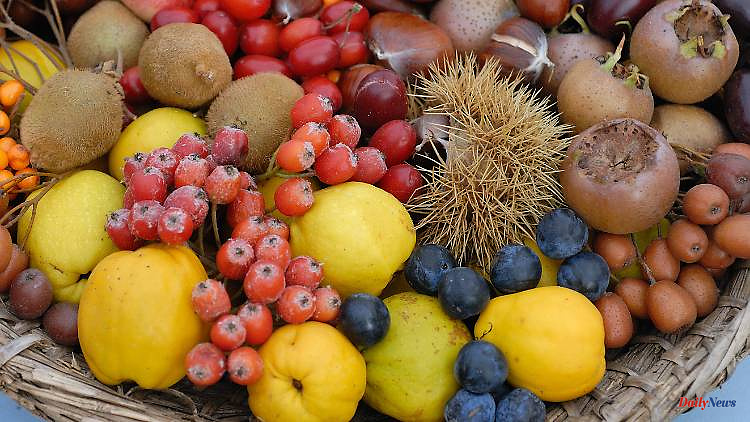Can we eat the autumn weather nicer? A medical journalist has a clear answer: Yes! Here he reveals which foods can brighten our mood.
Wet weather, cooler temperatures, less daylight: Autumn affects the mood of many people. If you then reach for certain foods, you can boost your mood a little. Andreas Jopp, medical journalist and author of "Happy Food Instead of Burnout", reveals in an interview with the news agency spot on news to what extent nutrition influences susceptibility to stress and the psyche and which foods we should use to combat the autumn blues.
Can we actually eat ourselves happier and mentally more stable, as you write in your new book?
Andreas Jopp: Sweet and fat foods give our mood a short-term boost via rewarding messenger substances. The food companies manipulate us with it. Unfortunately, it is precisely these two substances in highly processed foods that cause mood levels to drop more and more after a short time, as they have an inflammatory effect on the brain. Inflammation triggers mood swings and attacks the fine neurons in the brain. Our brain reacts very dynamically to food.
Biological substances from a good diet and good fats, on the other hand, stimulate growth factors that repeatedly repair and build up the stress center in the brain - the hippocampus. This leads to his more stable mood and more stress resistance. Most people think their brains and psyches somehow function independently of what we eat. In fact, brain function is affected more quickly than other organs by good or bad nutrition. The risk of depression increases by 35 percent when we eat a lot of highly processed foods. And depression is just the tip of the iceberg. Long before that, we have mood swings and feel the same stress more and more. Ultra-processed foods now make up 56 percent of the diet of all Germans. This has fatal consequences for the psyche.
What would the optimal happiness diet look like?
Preferably as many plant substances as possible. It brings down inflammation levels, stimulates BDNF the most - the key growth factor for new brain growth, and feeds billions of gut bacteria. These only use plant substances. In return, they then produce vast amounts of anti-inflammatory messenger substances and psychomolecules for us. Today we know how closely mood, brain performance and brain degradation are related to our bacterial roommates - the microbiome.
Are there superfoods among the organic substances?
Smart shopping is important. A handful of dark berries contain ten times the brain antioxidants of a light-colored banana. Five times as many in deep green arugula as in an iceberg lettuce. Smart means shopping in as dark a color as possible. Eat berries daily (raspberries, blueberries, blackberries), dark salads, broccoli and dark cabbages regularly. Drink more homemade green smoothies. The red and green pigments protect the brain and bind harmful free radicals there. Free radicals have an inflammatory effect and are one of the causes of depression. This is shown by a new analysis of 18 studies.
Also, eat lots of flavonoids. These plant substances have been shown to lead to a strong release of the growth factor BDNF. He cleans the brain. Citrus fruits, turmeric, nuts, dark berries, fruits and vegetables and cocoa are rich in flavonoids. Turmeric is a special superfood: It not only stimulates BDNF, but also has a strong anti-inflammatory effect that only strong drugs can otherwise achieve. A new study evaluation of ten studies confirms the antidepressant effect of turmeric.
Additional vitamin D is also important from autumn onwards. That keeps the mood stable. Low vitamin D levels make you prone to mood swings.
Which foods are mood killers?
Eating lots of saturated fat ramps up inflammation levels, dropping BDNF by 38 percent in a short amount of time. That changes the brain. The inflammation increases the risk of depression by 40 percent. Too much fatty meat, sausage, cheese, fatty dairy products - they all ruin your brain health.
The second mood killer are the highly processed foods: too sweet, too greasy, too many calories, not enough biological substances, too little dietary fiber for the bacteria factory in the intestine.
Can we also improve very bad mood values, such as depression?
Severe depression is the ultimate test of whether good nutrition works. The new research field of "Nutritional Psychiatry" shows that severe depression can be treated many times more successfully with a diet rich in biological substances than with antidepressants or psychotherapy alone. According to the latest evaluations, antidepressants are barely above the placebo effect and do not work at all in most patients.
Biological substances, on the other hand, rehabilitate important parts of the brain and this has an effect on the psyche. This changes the biological proportion of mood swings. Psychotherapy then focuses on the real problems. Dietary change is therefore now the first therapeutic measure in the official clinical treatment guidelines for depression in Australia and New Zealand. More people should be informed about this.
How could you sum it all up in one memorable diet tip?
Reach for the traditional Mediterranean diet. It contains good fats and many biological substances. A salad first, lots of vegetables and legumes, a handful of nuts, lots of herbs, good oils, some fish and hardly any meat - this is how you keep your brain healthy and your psyche stable. The Mediterranean diet has been proven in many studies to lower inflammation levels, has good biological substances for the bacterial factory, and, as an evaluation of 26 studies shows, there is the least depression. Biomaterials sanitize the brain and work on many levels at the same time. This is particularly important on cloudy autumn and winter days. So happiness is right on your fork.












